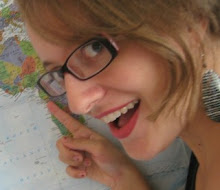I’m sorry to anyone out there who is actually still reading my blog…sorry for the inexcusable distance between posts and for the fact that all I have to talk about these days is the photos of my infant daughter.
In an act of blogging contrition, I bring you “Ten Days of Congo Culture.” The challenge to myself is to blog every day for the next week and a half and to share with you some interesting aspects of Congolese life. I don’t even think to write about many intriguing things because I forget that they are fascinating; they’ve become ordinary to me after having lived here for nearly 6 years!
Day 1 Mermaids

Congolese people believe in mermaids. Yes, the creatures that live in the sea. I’m not talking about something cute like Ariel, the Little Mermaid, however. These are spiritual beings, evil spirits that live in the water. From a Christian perspective, I would say they are demons. To Congolese people, even the Christian ones, mermaids are very much a reality.
It’s not as big of a deal here in Brazzaville, although there are spirits in the rivers; but in the port city Pointe Noire, it’s a very real and present danger. The spirits in the water beckon people and if you cede, you become enslaved to them. There are both physical dangers, such as drowning, and a spiritual danger of bondage and deception.
Some people are married to a water spirit. Every night, as if in your dreams, you go under the water and interact with the beings there. At first it may be like a choice to you, but after a while it’s an obligation. People in this situation must receive deliverance ministry to be set free.
There’s no point in telling a Congolese person that mermaids don’t exist. It would be like saying there’s no such thing as the wind. They will recount numerous stories of people they know who have been affected by this phenomenon.
In French the word is siren. An English dictionary definition of the word refers to classical mythology, sea nymphs who were part human and lured mariners to their destruction by their beautiful singing. I wonder why in our days we have Disneyfied the concept and turned them into creatures suitable for children to play with? With my Congo cultural influence, I’m not sure I’ll be able to let Maria enjoy The Little Mermaid as I once did.
 In the US the car horn is used with much restraint. With the phenomenon of road rage, I think we’re actually afraid to honk at this point. Not in Congo. Restrained is the opposite of how the horn is employed. Liberally and loudly the horn is used. Really, the more the better. You honk at pedestrians and at other cars to warn them you’re coming through. You honk when other guys cut you off. You honk when you’re stuck in traffic. You honk when the light turns green (not because the person in front of you fails to move, just right when it changes everybody in the line-up honks!). And let’s not forget the taxis that run a set route like a bus who continually honk their horn the ENTIRE time to let people know they’re available.
In the US the car horn is used with much restraint. With the phenomenon of road rage, I think we’re actually afraid to honk at this point. Not in Congo. Restrained is the opposite of how the horn is employed. Liberally and loudly the horn is used. Really, the more the better. You honk at pedestrians and at other cars to warn them you’re coming through. You honk when other guys cut you off. You honk when you’re stuck in traffic. You honk when the light turns green (not because the person in front of you fails to move, just right when it changes everybody in the line-up honks!). And let’s not forget the taxis that run a set route like a bus who continually honk their horn the ENTIRE time to let people know they’re available. 


